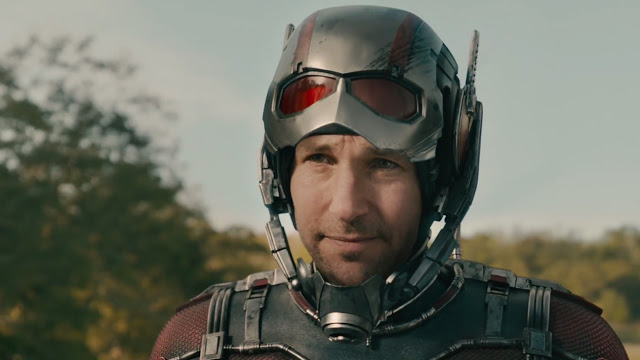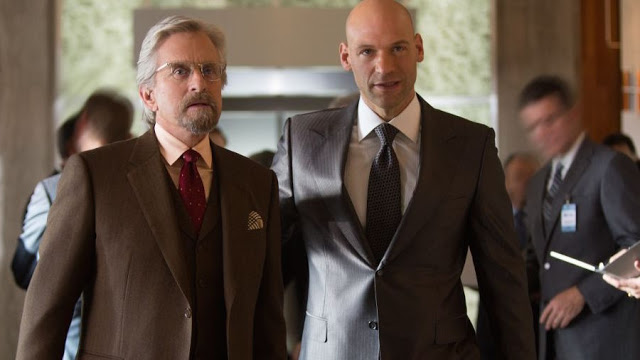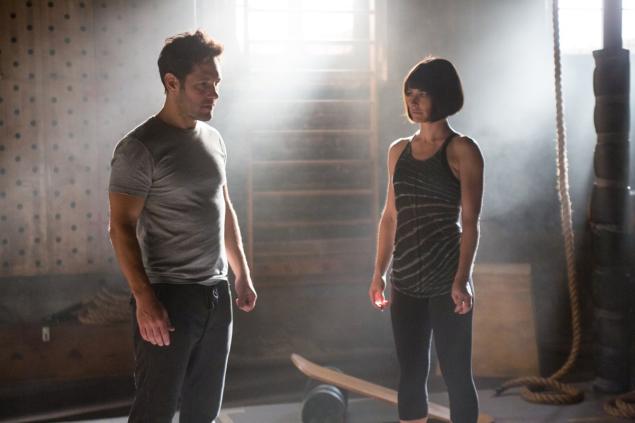Given that it’s a movie about a man who turns into a bug, it’s only fitting that Ant-Man feels small. That is part criticism, part compliment. Ant-Man is not especially memorable; it does not dazzle like The Avengers, nor does it charm like Guardians of the Galaxy. But in an age where bloated superhero franchises buckle under the weight of obligation and fan service, it’s almost refreshing that Ant-Man—the concluding chapter in Phase Two of the scrupulously planned Marvel Cinematic Universe—feels so cheerfully trivial. Sure, Tony Stark’s dad shows up in the prologue, and the post-credits stinger ties it in with next year’s Captain America offering, but for the most part, this is a minor movie about a down-on-his-luck dad trying to get a job so he can pay child support and see his daughter. It is not exactly the stuff of legends, but there is valor in its modesty.
And in its lightness. Ant-Man benefits from a relaxed, nonthreatening tone that makes it feel less like a superhero adventure than a hangout flick. That begins with its casting of Paul Rudd as Scott Lang, a reformed thief trying to make it on the straight-and-narrow. Rudd has never displayed great range as an actor, but he’s developed into a quasi-superstar through sheer affability, not to mention a gift for bemused reaction shots. His presence lends the film a laidback vibe that it mostly embraces, which helps deflect the absurdity of its plot and the stupidity of its pseudo-science.
Unfortunately, there is still entirely too much of that. The central storyline in Ant-Man doesn’t really involve Scott at all. It instead focuses on Dr. Hank Pym (Michael Douglas, acquitting himself nicely to this bombastic environment), a brilliant scientist who decades ago developed a secret formula that allows a soldier to shrink to the size of an insect, provided he’s wearing a specialized suit that looks like Immortan Joe’s getup in Mad Max: Fury Road crossed with Hazmat gear. Hank ultimately abandoned the project because of fears that the military might pervert it, fears that his successor, Darren Cross (Corey Stoll, enjoying his first flirtation with true villainy), is intent on realizing. Hank is thus scheming with his daughter, Hope (Evangeline Lilly, borrowing Uma Thurman’s wig from Pulp Fiction), to steal Cross’s revamped technology (or, I dunno, something) before Cross delivers it into the hands of Hydra, the sinister baddies whom Robert Redford slyly commanded in Captain America: The Winter Soldier. Now, if only Hank and Hope had a line on a particularly talented and desperate thief…
And so, Ant-Man is yet another superhero origin story, even if Ant-Man himself is unlike any superhero you’ve ever seen. The story of his birth—which forms the movie’s middle passage, when Hank and Hope recruit Scott to become the titular bug-man—is both utterly ridiculous and a surprising amount of fun. Training montages are inherently entertaining, and Rudd approaches the role with the proper mixture of excitement and incredulity. He and Douglas have a natural student–professor chemistry, and if the manufactured romance between Scott and Hope feels even more contrived than typical, at least the actors are clearly enjoying themselves. The problem is that they’re working in service of a fundamentally inane premise. See, Scott’s duties as Ant-Man go far beyond just shrinking and then wreaking havoc on larger foes with his insect-like abilities. No, he must also learn—through a combination of a hearing-aid-like device and profound mental focus—to control his assistant ants and compel them to do his bidding. Yes, this movie is about a man who doesn’t just become a bug; he talks to bugs.
Look, suspension of disbelief is a cornerstone of comic-book adaptations. We enter into a silent contract with Marvel’s filmmakers: They entertain us with whimsy and spectacle, and we ignore that they’re selling us intrinsically childish material. But even approaching it with active naiveté, Ant-Man is tough to swallow. It is one thing to accept the physics of miniaturization; pint-sized humans have long been a cinematic staple, from Fantastic Voyage to Honey, I Shrunk the Kids. It is something else altogether, however, to grapple with the notion that Scott, or Hank, or anybody, can somehow use his brainpower to manipulate hordes of insects into building bridges, starting fires, and performing other coordinated actions. That is one heck of a Jedi mind trick. Sure, Yoda may have used the Force to levitate Luke’s X-Wing out of Dagobah’s swamp, but did he ever teach ants to put sugar cubes in his coffee? It doesn’t help that Peyton Reed, the director, can’t fathom a way to visualize this mental process; he just trains the camera on Scott’s face and watches as he tries to amass the requisite concentration, which only results in Rudd looking constipated.
Failing to communicate Scott’s mind-power isn’t the only area where Ant-Man falls short visually. Admittedly, as foolish as the movie’s foundation may be, it gives rise to some intriguing possibilities in how to depict its tiny hero and its microscopic world. But while Reed shrewdly toys with scale, he never fully capitalizes on the movie’s big-versus-small dichotomy from an action perspective. We see ants skittering from one area of the frame to another, but we never properly understand how they use their strength, or their speed. As a result, Ant-Man‘s action sequences are skillfully edited but often confounding. It is difficult to lose yourself in a fight scene when you’re constantly wondering how the hell the hero is pulling this off.
Yet in spite of these many flaws, Ant-Man is persistently enjoyable, largely because it rarely takes itself seriously. Surprisingly, even though Reed pinch-hit for Edgar Wright after the latter departed the project due to “creative differences” with Marvel, the movie never feels splintered or erratic. It has a bouncy, infectious wit, and it is substantially more playful than the typical dour franchise fare. There is, for example, an amusing scene in which an apologetic Ant-Man battles an Avenger (Anthony Mackie’s Falcon), systematically immobilizing him while constantly professing that he’s sorry. And while the movie dutifully obeys the unwritten rule that all comic-book adaptations must conclude with a lengthy, special-effects-driven action extravaganza, this is undoubtedly the first that does so within the realm of a Thomas the Tank Engine train set. Even the soundtrack gets in on the act, at one point switching suddenly from Christophe Beck’s unmemorable score to the transcendent and inspiring synths of The Cure.
But the best bits in Ant-Man, as you might expect, feature little action at all. They instead involve the unforced banter between Scott and his confederates, be they Hank and Hope or, even better, Michael Peña as a motormouthed sidekick who can’t relay information without wandering off into discursive tangents. It is in these scenes where Reed demonstrates real flair—he flashes back to different characters talking in rapid succession, only they all speak in Peña’s voice, a technique that transforms the usual expository info-dump into a comic delight.
All told, Ant-Man distinguishes itself from Marvel’s usual pyrotechnics, both for good and for ill. It is funny, entertaining, and even kind of sweet. But it is also undeniably asinine, with a paltry storyline and mediocre craftsmanship that fails to measure up to the studio’s enviable standard of technical excellence. Of course, I suppose this is only logical. Here is a movie whose quirky peculiarity is both a feature and, at the same time, a bug.
Jeremy Beck is the editor-in-chief of MovieManifesto. He watches more movies and television than he probably should.



